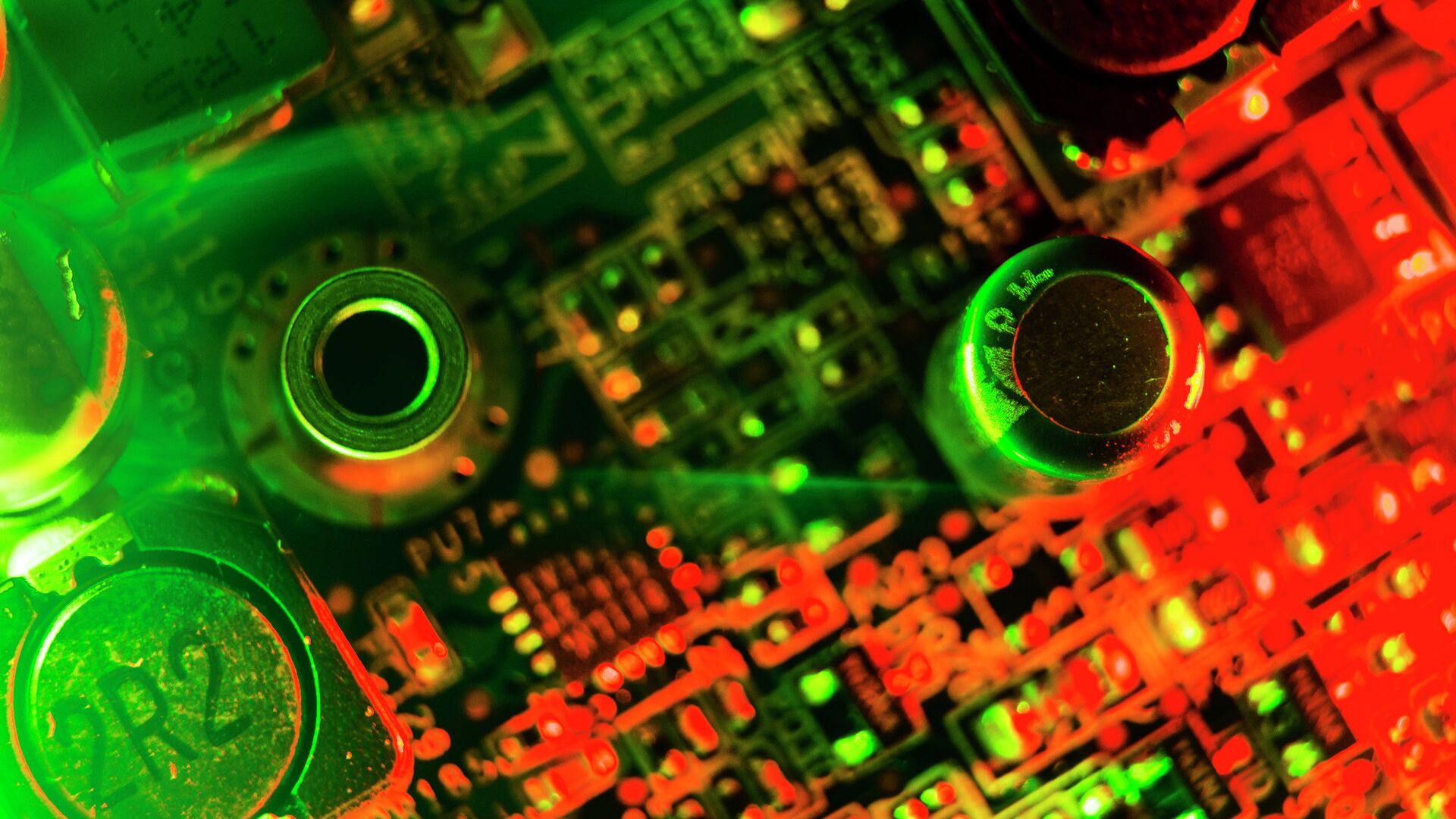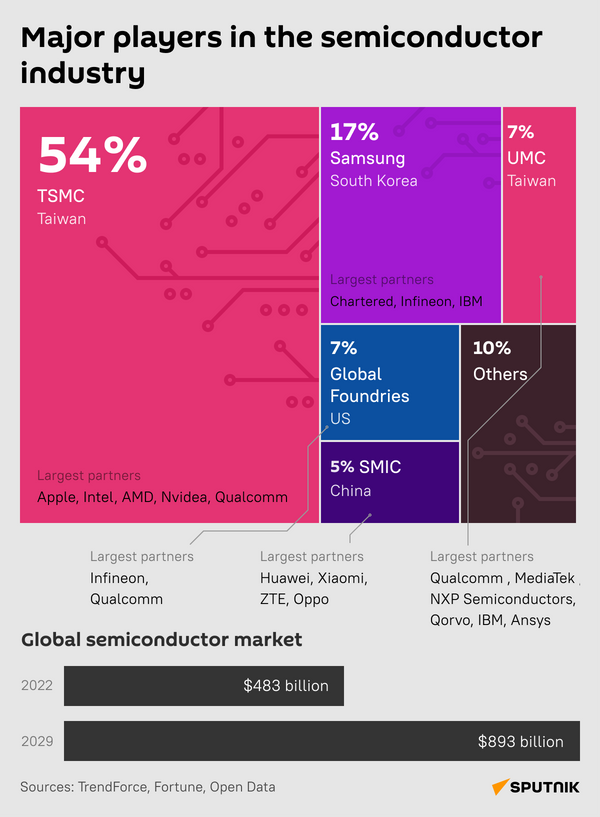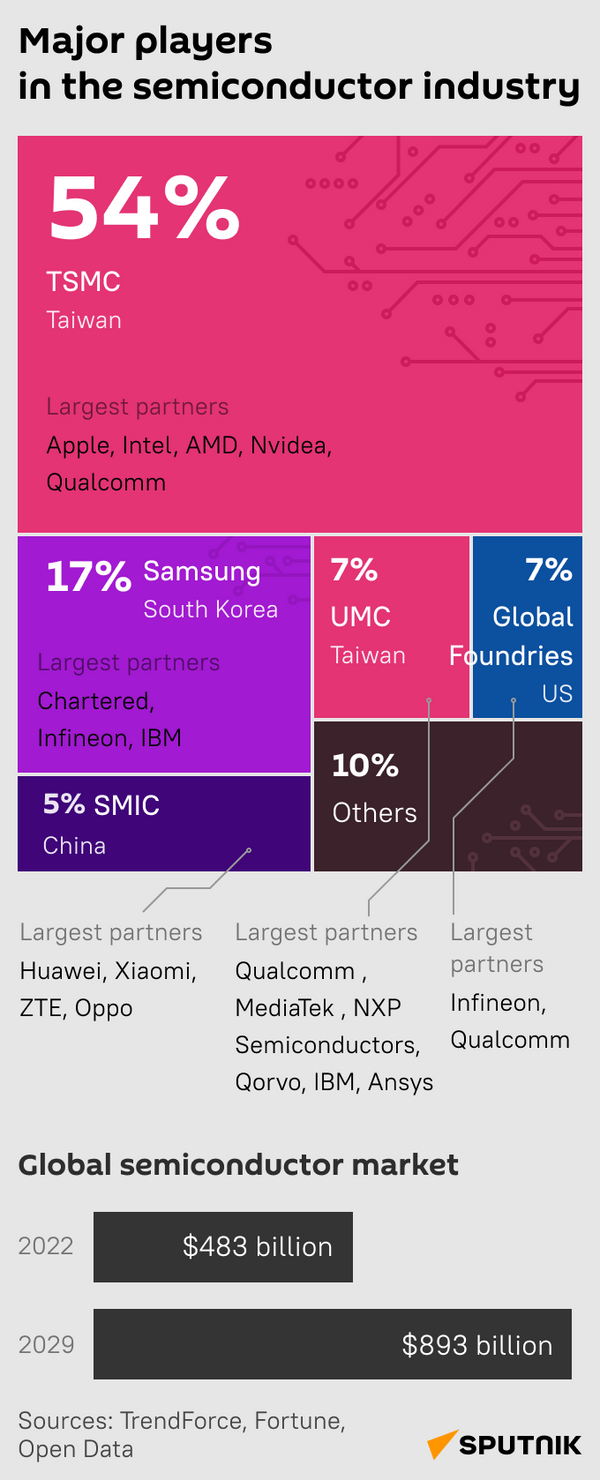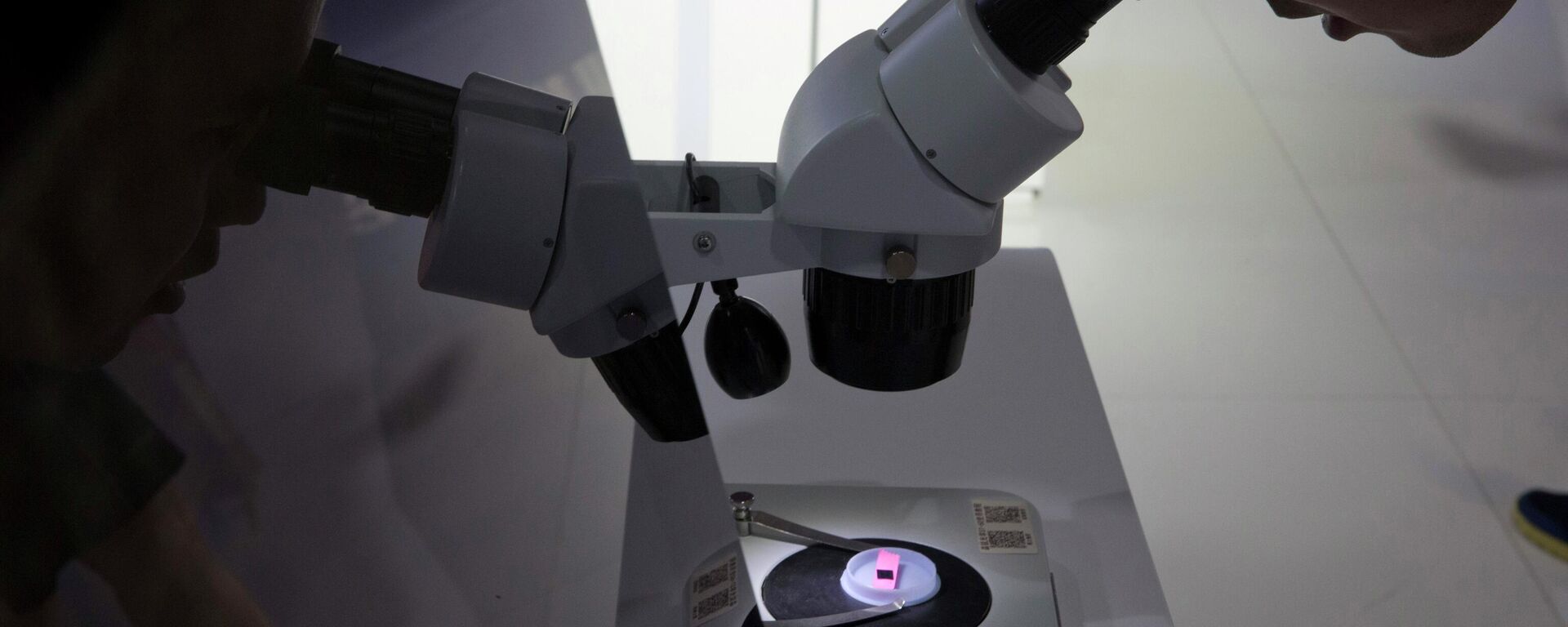https://sputnikglobe.com/20221109/how-taiwans-outsized-clout-in-semiconductor-manufacturing-is-weaponized-by-biden-admin-1103942071.html
How Taiwan's Outsized Clout in Semiconductor Manufacturing is 'Weaponized' by Biden Admin
How Taiwan's Outsized Clout in Semiconductor Manufacturing is 'Weaponized' by Biden Admin
Sputnik International
Semiconductors, an essential component of electronic devices and, so to say, the ‘lifeblood’ of the global digital economy, have been pushed to the forefront... 09.11.2022, Sputnik International
2022-11-09T16:26+0000
2022-11-09T16:26+0000
2023-06-19T12:45+0000
world
semiconductors
apple
intel
nvidia
joe biden
nancy pelosi
xi jinping
asia
taiwan
https://cdn1.img.sputnikglobe.com/img/102124/91/1021249196_0:102:2048:1254_1920x0_80_0_0_67750055f4c4e4af470d7d043a1a6949.jpg
Today, four Asian economies - Japan, mainland China, South Korea and Taiwan - are leaders in the field of chipmaking, their enterprises churning out an estimated 80 percent of all semiconductors in the world. The lion’s share of these ‘brains of electronics’ that enable smartphones, radios, TVs, computers, video games, or medical diagnostic equipment to function - or about 63 percent - is currently produced in Taiwan.Last year, the Taiwan Semiconductor Manufacturing Company Limited (TSMC) managed to become the undisputed leader among all companies on the Asian continent. ASE Technology, with a revenue of 12.5 Billion US$, ranks second in the island state, and AU Optronics – third.If one takes a closer look at the client list of Taiwan’s top chipmaking firm, TSMC, the names of America’s technology giants, such as Apple, Intel, AMD, and Nvidia - the biggest producer of graphics processing units (GPUs) used in video graphics and machine learning systems - offer a glimpse into the strategic moves the Washington administration has been taking regarding its geopolitical rivals.Apple accounts for about one-fifth of TSMC's annual revenue, with North America being the Taiwanese firm’s largest market, according to the company's website.However, China, where the chipmaking industry was almost nonexistent some two decades ago, has been successfully playing catch up. Today, Chinese companies produce about 24 percent of the global semiconductor circuits. The sprint by China to develop the semiconductor sector, which is also crucial to development of advanced military technology, has infuriated the administration in Washington. Hence, the Joe Biden administration’s efforts to “weaponize” the issue to ostensibly "counter" China.Semiconductor Industry RaceAs part of its “Made in China 2025” initiative, Beijing has been relying on diverse policy incentives to boost the building of more semiconductor companies. Today, China accounts for 15 percent of global manufacturing in semiconductors, while the US share of the market has plunged from 37 percent to 12 percent. In response to the Asion giant's ambitions, the US recently implemented a chip export ban on China, while also fueling the flames of growing tension with Beijing over Taiwan. The situation around Taiwan flared after US House Speaker Nancy Pelosi visited the island on August 2, and was greeted by the Island's Foreign Minister Joseph Wu. China's Ministry of Foreign Affairs slammed the move as a “serious disregard of China's strong opposition.” Officially, the United States supports mainland China’s claim to the island, dubbed the One-China policy, and does not officially recognize Taiwan's independence.The controversial high-profile diplomatic visit prompted Beijing to unleash a series of unprecedented live fire drills in six locations around Taiwan. China also recently emphasized the need to “take resolute steps to oppose 'Taiwan independence’ and promote reunification” in a resolution adopted at the 20th National Congress of the Communist Party of China (CPC) that wrapped up on October 22. Furthermore, "in the face of serious provocations by separatist forces calling for Taiwan’s independence, and interference from outside forces," China's leader Xi Jinping said that "complete reunification of our country must be realized and it can without a doubt be realized.Amid speculation that a conflict between China and Taiwan could spell disaster for the US amid its reliance on the microchip supplier on the island, on October 7 the Biden administration imposed a sweeping set of export control restrictions seeking to cut China off from certain semiconductor chips and chip-making equipment. Under the rules, US companies can only supply Chinese chipmakers with equipment that to produce advanced chips after first securing a licence. US President Joe Biden also signed into law the CHIPS and Science Act of 2022. The legislation provides $52.7 billion in funding to strengthen the United States’ semiconductor manufacturing and supply chains, as well as over $200 billion for scientific endeavors. But China slammed what was billed as the largest US government bailout to the industry in decades as seeking to promote its underlying geopolitical objective.“It is another example of the United States abusing its national power and relying on technological hegemony to engage in coercive diplomacy,” Foreign Ministry spokesperson Zhao Lijian said at a press briefing. China also accused the US of engaging in “tech terrorism” against other countries, predicting that such moves would ultimately backfire.
https://sputnikglobe.com/20221004/us-efforts-to-curb-semiconductor-tech-exports-to-china-are-nonsense-pundit-says-1101509157.html
https://sputnikglobe.com/20220809/biden-signs-bill-bolstering-us-semiconductor-industry-science-amid-competition-with-china-1099427478.html
https://sputnikglobe.com/20220706/china-slams-us-attempt-to-ban-dutch-sales-of-chipmaking-equipment-1097021608.html
taiwan
Sputnik International
feedback@sputniknews.com
+74956456601
MIA „Rosiya Segodnya“
2022
News
en_EN
Sputnik International
feedback@sputniknews.com
+74956456601
MIA „Rosiya Segodnya“
Sputnik International
feedback@sputniknews.com
+74956456601
MIA „Rosiya Segodnya“
semiconductors, an essential component of electronic devices pushed to the forefront of political discourse between washington and other countries, taiwan semiconductor manufacturing company undisputed leader, joe biden administration’s efforts to weaponize semiconductor issue to counter china
semiconductors, an essential component of electronic devices pushed to the forefront of political discourse between washington and other countries, taiwan semiconductor manufacturing company undisputed leader, joe biden administration’s efforts to weaponize semiconductor issue to counter china
How Taiwan's Outsized Clout in Semiconductor Manufacturing is 'Weaponized' by Biden Admin
16:26 GMT 09.11.2022 (Updated: 12:45 GMT 19.06.2023) Semiconductors, an essential component of electronic devices and, so to say, the ‘lifeblood’ of the global digital economy, have been pushed to the forefront of the current political discourse between Washington and other countries, with the Taiwan issue a glaring case in point.
Today, four Asian economies - Japan, mainland China, South Korea and Taiwan - are leaders in the field of chipmaking, their enterprises churning out an estimated 80 percent of all
semiconductors in the world. The lion’s share of these ‘brains of electronics’ that enable smartphones, radios, TVs, computers, video games, or medical diagnostic equipment to function - or about 63 percent - is currently produced in Taiwan.
Last year, the Taiwan Semiconductor Manufacturing Company Limited (TSMC) managed to become the undisputed leader among all companies on the Asian continent. ASE Technology, with a revenue of 12.5 Billion US$, ranks second in the island state, and AU Optronics – third.
If one takes a closer look at the client list of Taiwan’s top chipmaking firm, TSMC, the names of America’s technology giants, such as
Apple, Intel, AMD, and Nvidia - the biggest producer of graphics processing units (GPUs) used in video graphics and machine learning systems - offer a glimpse into the
strategic moves the Washington administration has been taking regarding its geopolitical rivals.
Apple accounts for about one-fifth of TSMC's annual revenue, with North America being the Taiwanese firm’s largest market, according to the company's website.
However, China, where the chipmaking industry was almost nonexistent some two decades ago, has been successfully playing catch up. Today, Chinese companies produce about 24 percent of the global semiconductor circuits. The sprint by China to develop the semiconductor sector, which is also crucial to development of
advanced military technology, has infuriated the administration in Washington. Hence, the Joe Biden administration’s efforts to “weaponize” the issue to ostensibly "counter" China.
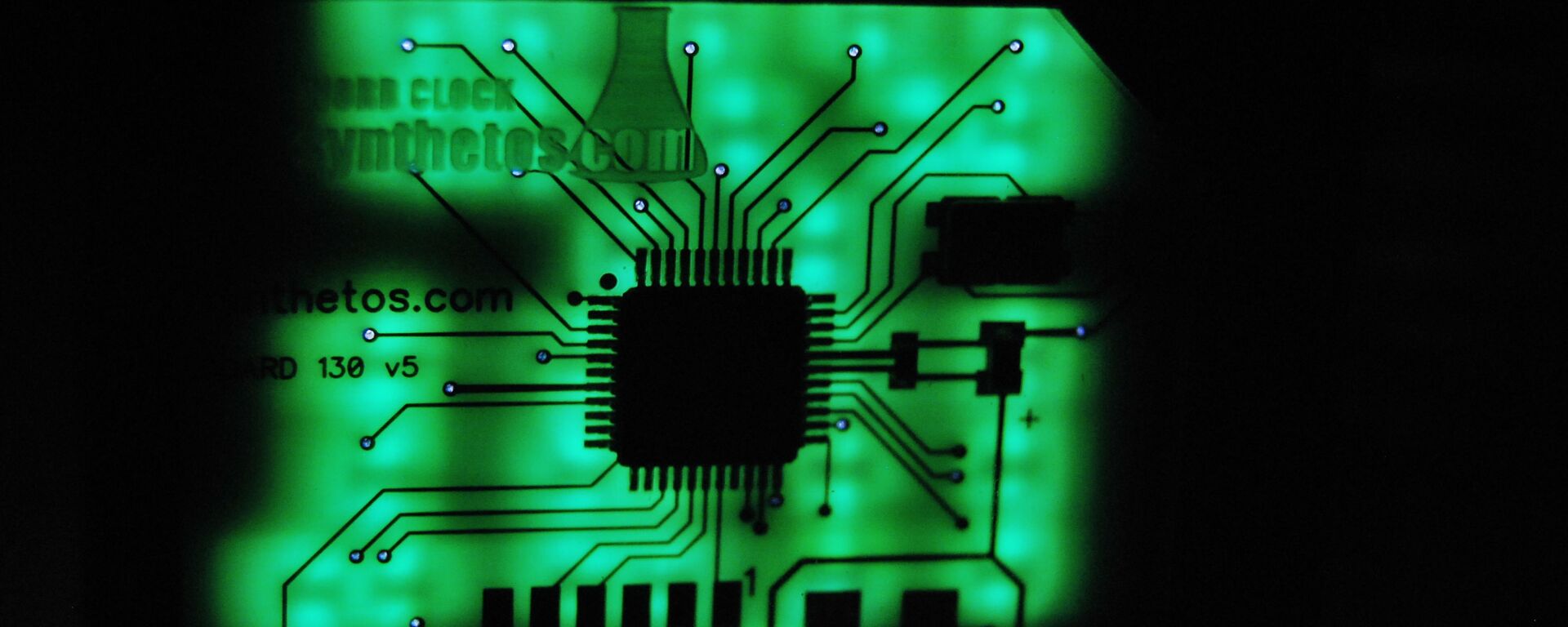
4 October 2022, 17:12 GMT
Semiconductor Industry Race
As part of its “Made in China 2025” initiative, Beijing has been relying on diverse policy incentives to boost the building of more semiconductor companies. Today, China accounts for 15 percent of global manufacturing in semiconductors, while the US share of the market has plunged from 37 percent to 12 percent.
In response to the Asion giant's ambitions, the US recently implemented a chip export ban on China, while also fueling the flames of growing tension with Beijing
over Taiwan. The situation around Taiwan flared after US House Speaker Nancy Pelosi visited the island on August 2, and was greeted by the Island's Foreign Minister Joseph Wu. China's Ministry of Foreign Affairs slammed the move as a “serious disregard of China's strong opposition.” Officially, the United States supports mainland China’s claim to the island, dubbed the One-China policy, and does not officially recognize Taiwan's independence.
The
controversial high-profile diplomatic visit prompted Beijing to unleash a series of unprecedented live fire drills in six locations around Taiwan. China also recently emphasized the need to “take resolute steps to oppose 'Taiwan independence’ and promote reunification” in a resolution adopted at the 20th National Congress of the Communist Party of China (CPC) that wrapped up on October 22. Furthermore, "in the face of serious provocations by separatist forces calling for Taiwan’s independence, and interference from outside forces," China's leader Xi Jinping said that "complete reunification of our country must be realized and it can without a doubt be realized.
Amid speculation that a conflict between China and Taiwan could spell disaster for the US amid its reliance on the microchip supplier on the island, on October 7 the Biden administration imposed a sweeping set of export control restrictions seeking to cut China off from certain semiconductor chips and chip-making equipment. Under the rules, US companies can only supply Chinese chipmakers with equipment that to produce advanced chips after first securing a licence. US President Joe Biden also
signed into law the CHIPS and Science Act of 2022. The legislation provides $52.7 billion in funding to strengthen the United States’ semiconductor manufacturing and supply chains, as well as over $200 billion for scientific endeavors. But China slammed what was billed as the largest US government bailout to the industry in decades as seeking to promote its underlying geopolitical objective.
“It is another example of the United States abusing its national power and
relying on technological hegemony to engage in coercive diplomacy,” Foreign Ministry spokesperson Zhao Lijian said at a press briefing
. China also accused the US of engaging in “tech terrorism” against other countries, predicting that such moves would ultimately backfire.
